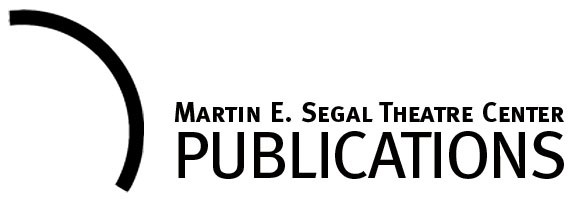A Pessimistic Background for a Start
When I see the nth show on our stages that is interested mainly in itself, or in the current fashion, or in its perfect following of a certain aesthetics, or in quickly earned laughter and applauses, or in anything else in the first place but not in the first place in us and our life here, I feel very sad and I think of how abandoned we are, as human beings, by our own theatre too. Then I see—or remember—another show of ours that treats the audience with care and love, and hugs us, and for a while I stop feeling like I’m alone on a raft in the Pacific Ocean in my own country.
But can I be cross with our theatre for being so much like our Bulgaria?! I know—as everyone else—so many wonderful people here, good and pure, yet our common life is so far from wonderful. The same applies to our theatre: we have great artists and star shows; yet, its general state is getting farther and farther from being wonderful. Our theatre reflects our Bulgaria in so many other aspects too. It reflects her in the unhealthy interest in the mafia’s life, while outside of the spotlight remain the real heroes of the transition period—those who managed to retain their humanity despite its “rules.” It reflects her in the sure bet on the turbo pop folk and the superficial comedy: allegedly for a making-ends-meet reason which easily transforms then into this-is-what-people-want shrug—a motivation whose cynicism could be patented by our media since it’s they who managed to impose it as an axiom. It reflects her in the misery—literal and figurative—in the atmosphere of hostilities and in the attempts for a one-by-one type of survival. Finally: it’s reflected in the clean-hands outbursts of snobbism in regard to all the above.
What my heart bleeds for most is the general abandoning of humanity in my country and what this means for people who are ill or old or simply helpless and alone.
Could such people find in our theatre support or solace or salvation? Does it feel any pain for them, for their lost dignity? So that it could warm them with the compassion of great art? And does our theatre dare to dream for a better life? So that it could give us hope? Does it believe in humanity, i.e. in Goodness? And if the answer is Yes, how does it fight for it?
Fearless, socially aware theatre that stands up for the human right for a dignified life is considered in my country as old-fashioned. If a foreigner who doesn’t know anything about our reality were to judge it by what they see in our theatres, they’d say we live a perfect life; sociopolitical criticism about the present is absent on our stages.
Emotion, too, is considered old-fashioned—especially if it’s positive. To be gloomy is okay, or derisive, or ironic. So what if that irony at times could be “a form of aggression…because it kills emotion” (according to the accurate phrase of Alvis Hermanis)? So much the better; destruction is in vogue, whereas to dream, to be constructive, to be inspired by beauty and harmony, to enjoy life—all this is considered superficial, lightweight, so to speak.
I can’t stop wondering why we so much need the shield of irony and derision, of all the gloomy masks—not only onstage but in our lives, too. Why are we so afraid of being free? Free of fears, of possible negative comparisons (not in our favor), free to openly believe in love and in goodness, free to do good together, to be together despite our differences—the most difficult for us!
Luckily, several shows in recent years have made me hopeful that our theatre is about to prove itself capable of outgrowing this. For they deal exactly with freedom. They are: Life Is Beautiful at the National Theatre; The Viewpoints of a Teacher on the Folklore at the Army Theatre; and One Small Radio at the Satire Theatre. They, or at least parts of them, love us—us, here, and human beings in principle!—in this elevating, charging-with-energy manner that distinguishes really great art from a merely well-made show, play, or role. They are like essays on happiness in the life of the human spirit. Essays that do not just try to reach insights on this matter but, while doing it, leave at times the territory of the classically dramatic and enter into another one, very rarely accessible for art on the whole—the territory of bliss, dwelled in by our souls when we are at peace with ourselves. In other words, these shows touch upon the very core of human happiness. And again, as Hermanis says, “The hardest task of all is to make a performance about harmonious and happy people. Technically, it is a task on the highest level of complexity.”
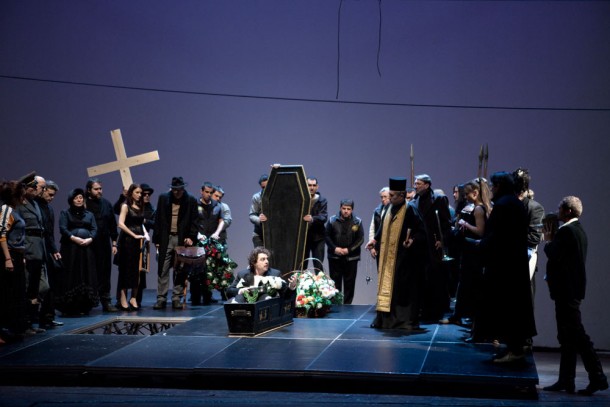
Life is Beautiful directed by Alexander Morfov. Photo courtesy of Ivan Vazov National Theatre.
Alexander Morfov and Kamen Donev: Details of a Star Encounter
At their encounter for the production of Life Is Beautiful (after The Suicide by Nikolai Erdman), Morfov (director) and Donev (leading man, also a playwright and director himself) arrived with similar baggage. Both are working in the theatre because they are interested in life in the first place (to paraphrase another great phrase of Hermanis, “If you make theatre, it’s not so much important to be interested in theatre, it’s important to be interested in life.”) Then, for both of them what matters is not the facade of life but its substance, therefore their theatre has never been snobbishly artificial. Also, they are not interested merely in a certain part of life but in life on the whole. That’s why their theatre can both fly and wipe its sweat off its forehead —at times it works out, at times not—it errs and it’s not afraid of erring. Therefore one could, for instance, have an urge to edit it, to cut lengths or even return it for reworking.
In brief, these are two people who so much and so truly love life that they are not afraid of being alive given everything that entails: risks, ups and downs, huge successes, and failures.
And since both of them know very well that it doesn’t boil down to their own days on this earth, neither on those of a group of friends, they are interested in our common life and do care about it.
It’s enough for one to read the interviews of Morfov in order to feel his pain for the state of humanity in our country, for the ostensible security of a 150-170 Euro salary, which he calls “a hidden unemployment.”
It’s also enough for one to analyze the nature of Donev’s motivation for writing his plays (some…already). His, in the beginning, nearly childlike amazement at the phenomenon of kitsch, the attempt to encompass it and to show it onstage as a mirror in order to provoke purifying laughter, the perplexity then at the realization of the Amazon-jungle speed at which this Absurd grows up intent on devouring everything in its path, and, finally, the close examination of its mechanisms. The choice of kitsch as an object of Donev’s dramaturgy has nothing to do with a search of easily achieved laughter of the TV type of parody. Not by chance he’s one of the few brilliant comics of ours who did not sell themselves out to TV. He’s interested in kitsch, since his heart bleeds for those people who grow up in such reality and who often have no other choice but to accept it as the only possible one. He tries to show the distorting effect of the kitsch not in order to sneer at those who are, so to speak, inside it or at those who are about to be devoured by it; on the contrary, his aim is to help them overcome the situation and change it.
Exactly in the course of this close scrutiny of kitsch, Donev managed to master an extraordinary flair for—and skill at—handling the abstract montage, the basis for much modern art; the montage based on associations and reaching via short-cuts routes, different from the classical narrative, to the essence of things. A sort of jumping-up from frame number one into frame number ten, or even number one-hundred, which resembles climbing at once many stairs and finding oneself at places entirely unexpected by the person who’s still at step number one. A montage can predict and tie up a story from ostensibly unconnected, and unrelated common events; a montage that makes things look surreal and takes us seemingly very far away, while in reality it incessantly springs up from, and ricochets back to, the departing point. So that the person at step number one—i.e. at the start of the absurd—could see where it leads.
Via quick jumps in this montage and the parallel increase of the distance between the “frames,” Donev managed to make palpable another absurdity too—that of the nowadays inhuman haste, the madness into which we have turned our life.
It’s exactly this absurd-montage approach that is partly the explanation for his extraordinary role in Life Is Beautiful as well as for the amazing effect of his one-man show, The Viewpoints of a Teacher on Folklore (in existence since 2007, playing to full houses not only in regular theatres but also in 4,000-seat halls; now followed by its sequel The Viewpoints of a Teacher on Education).
Of course, the evil spirit of our inability to share other people’s joy and even less so their success, and to appreciate otherness on the whole, didn’t miss the opportunity to disdainfully label Donev’s one-main show “pop folk” and “purely commercial” or to bypass it with lofty silence because “it’s not exactly theatre.” Yes, The Viewpoints is not only a theatre event; it’s a cultural event at large. And the huge interest in it proves that the vicious this-is-what-people-want motivation is nothing but a false axiom, one of the many being ingrained in our minds. Because we, human beings, can—in principle and still!—recognize beauty and can differentiate truth from the false (when these categories do not apply to material goods). To tell one from the other is innate to us. And it’s this innate awareness that made people immediately react to Donev’s show as something necessary and long overdue.
For, with The Viewpoints, he was the only one who took on a fight against kitsch not via the destruction and alienation of mockery, neither via didactic edifying, but by countering it with beauty—the beauty of our folklore and his/our love for it—and emphasizing the difference between the original and the distorted copy. Differences which we tend to forget when, in our desire to draw a line between us and the kitsch, we loftily disassociate ourselves from everything having to do with the rural life and turn it into a synonym of ugliness.
With The Viewpoints, Donev reminded us of the value of our authentic folklore, of the feeling of security that the common roots and belongings give us, of the amazing strength a constructive approach has both in art and in life. Moreover, he did that not in a eulogy manner but constantly applying the contrast between the elevated and the kitsch, and by constantly underlying (via the abstract montage) that the one-hundred steps between them, both in life and in art, could at times be taken in one breath.
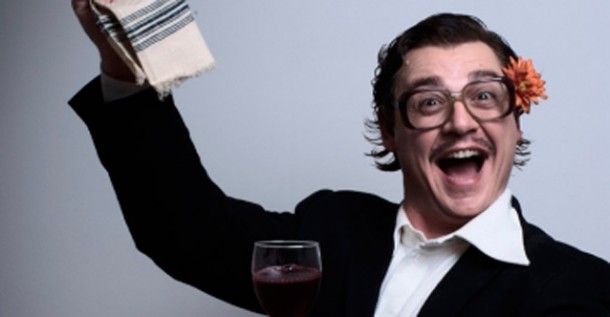
A Teacher’s View on Folklore by Kamen Donev. Photo courtesy of the Army Theatre.
The Viewpoints was Donev’s spring-board towards his role of Podsekalnikov in Life Is Beautiful because it was exactly with his one-man show that he entered the sphere of the most difficult in art: harmony and happiness. To make exultation on stage not feel boring and not look clichéd is a real achievement today, when suspense is obligatory and the audience’s attention span is so short. To achieve authentic exultation alone onstage, for a long time at that—and in our country on top of it!—is such a rarity that till recently it was a trademark mainly of the one-man show virtuoso Marius Kurkinski; as was the talent, in addition to this, to take off and rise to an even higher territory—that of bliss and spiritual peace.
In his role in Life Is Beautiful, Donev transforms these take-offs into a long flight. A flight whose height is all the more palpable and whose impact is all the more elevating—the best word is appeasing—not only because it has as a background and a counterpoint the deliberately heavy flesh of the everyday reality (as a stage design) and because it uses laughter as a springboard but, most of all, because the main source of its energy is the inner urge and necessity to dream—for a better life and a better self.
Bulgarian theatre is blessed with great comic talent. Very rarely, though, is that talent being combined with a flair for lyricism, for making a dream on stage not sound artificial. And the silences in the theatre hall in the moments of a genuine flight of the spirit could not be mistaken for anything else. They are the Alleluia of the theatre: when we have the chance to raise above all animosities, above all the objections of the Ratio and to feel—with all our being that every second of life is God-sent, that there is hope—that life is, indeed, beautiful. A triumph exactly of this limitless range of the Chaplinesque type of talent, lyrical and comical in an equal measure, is the role of Donev in Life Is Beautiful.
Morfov’s contribution to this achievement should not be overlooked, though. He managed to free and channel Donev’s energy that had till then been flowing into so many channels. He gave him the chance to use his abstract montage and the contrast method in an unusual for him type of theatre. Most important, he stood by him in his daring urge to dream on stage, encouraging him both as a comic geyser and in the moments of magic elimination of gravity.
Morfov has a great talent and taste for magic onstage. Not by chance one of his main contributions to our theatre—which has didactics in its genes—is that he helped it set itself free from the prejudices against spectacle on stage, from the deeply ingrained suspicion that a balance between spectacle and philosophy there is possible. In other words, he endowed our theatre with the “free love” in magic onstage without depriving magic from a substantial meaning. With Life Is Beautiful, Donev, on the other hand, brought into the unbridled flesh and energy of Morfov’s theatre a non-didactic morality—the morality of an unconditional faith in Goodness.
So, their encounter exactly at this point of their artistic development turned out to be very fruitful. It helped the best of both of them come out and be transformed to a new level.
Despite some weak passages in the second part of the show, Life is Beautiful is the most mature Morfov production in Bulgaria. The very popular Outcasts (also at the National) is also very good but in its core it has the bitter energy of despair—despair of an unattained and, as it looks like, unattainable ideal for Bulgaria. It’s this so to speak anti-energy—the most concrete expression of which is the feeling of meaningless of all efforts—that not only grabs the audience by the throat but also sends everything wonderful in this show in the cul-de-sac of helplessness. While Life is Beautiful, on the contrary, is like a store of positive energy, of hope. Moreover, this is the energy of the very core of life—that of the Spirit and its triumph in the human being.
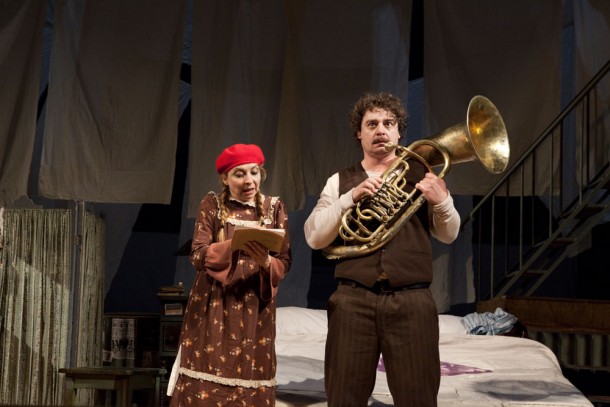
Life is Beautiful directed by Alexander Morfov. Photo courtesy of Ivan Vazov National Theatre.
Stefan Moskov and Maia Novoselskaya: a Star Couple in a New Light
Frankly, I had stopped expecting such elevating experience from the theatre of Moskov in Bulgaria (unlike his productions in Germany). I even felt like not going to see it at all, so monotonously repetitive has his parody approach to everything been for such a long time. Cyrano de Bergerac at the National brought back my interest in him thanks to the incredible work with the actor Deyan Donkov in the main role and because this beautiful show reminded me of the lyricism of Moskov’s first works. But again, in line with Christian, the feeling of fear prevailed: this fear of Moskov’s to show that his theatre can fly—and so well at that!—lest it (and he) falls, i.e. lest he becomes vulnerable. This fear made him stick to the far easier things, such as giggling and sneering about how funny, preposterous and even appalling it is when someone else, or some other people, or all of us altogether cannot fly. Instead, we should be encouraged to break out of the vicious circle of our constant disdainful referring to any badly done thing in our country as “Ah: a Bulgarian job!” (in the sense that we, sure, know it’s a badly done job, what else could it be?!) Such a phrase can be used to easily explain every failure and shortcoming happening here, while conveniently placing ourselves, so to speak, outside and above them—as if the reality of our country is a parallel world having nothing to do with us concretely, as if we could in effect disassociate from our own selves.
Moskov let himself be obsessed with parody and irony, thus limiting the scope of his talent, for two reasons. Partly because of the unconditional approval of fans and critics alike that has accompanied his career here. But, more importantly, due to a special insecurity of his: that, yes, the spirit is marvelous in principle but in the human body and via human feelings, it’s being somewhat distorted; the body’s shortcomings and the feelings’ extremes not only bring it down into the territory of the low. Even worse, they make the spirit’s longings, even the most cherished purity, look preposterous due to the cruel caprices of Nature to often put a beautiful invisible essence into an ugly visible “costume”/body. Maybe because of this distrust in life’s flesh Moskov insists on having immaculately beautiful sets in his shows—if the rest is not guaranteed…Maybe, for the same reason, in his Cyrano he allowed himself to be lyrical and dream—all cards are a priori put on the table in this play and there’s no danger of mistaking what the spirit actually is. But isn’t it true that in our dimension the soul gets, one might say, locked into the body, with its limitations and challenges, the biggest one of which being for the soul to manage to stay beautiful despite the concrete possibly imperfect parameters of the “costume”?! And isn’t it true that great theatre is expected to help us feel exactly the frequencies of the invisible?
A theatre of different frequencies—this is the best way to describe the last half hour of Maia Novoselskaya’s solo show, One Small Radio, directed by Moskov and jointly authored. Its unexpected, at least to me, coming to life is an encouraging fact both for our theatre and our life in Bulgaria. Because it’s like a revelation, as a sign that we should not lose hope, that resignation is, indeed, ugly (according to the very correct definition of Isabel Allende). This last part of the show is like an incessant high, like the flight with God, with which Erik-Emanuel Schmidt so wonderfully compares Mozart’s music (in his novel My Life with Mozart): taking place in a territory above and beyond feelings, where there’s bliss and peace, where one reaches mysticism via art, where our eyes are opened to the invisible. In their show Novoselskaya and Moskov call this “entering between the radio waves.”
“Unhappiness is a story. Happiness is a fable,” says Haruki Murakami, the Japanese writer. Unlike Life Is Beautiful, Radio is entirely a fable. Unlike Morfov’s show, which is about both life’s flesh and its spirit, the last part of the Radio is only about the spirit; about its flight which in human language we call a dream or happiness; about happiness being not so dependent, as we tend to think, on the concreteness of the body. A bird which in the beginning of the show applies to become a human being and which doesn’t have another choice but “a not so pretty body,” at the end “flies” in this body without its imperfections being an obstacle at all. What happens meanwhile is a gradation from a derisive “I love you!” (to life, human beings and herself) to a fully genuine, unconditional “I love you!” (again, to life, human beings and herself). It’s the nature of this jump that makes happiness possible.
Novoselskaya, like Kamen Donev, has an extraordinary talent where lyricism and comic intertwine. But, like Moskov, she feels uneasy about the human body and the possible role of its imperfections in bringing the spirit down—something which does not help her unleash the lyrical streak of her talent on stage in our country (she too works frequently in Germany). In the beginning of Radio, both she and Moskov are on their mettle—i.e. in the rage of parody and derision—as if to prevent any possible mockery to go in the opposite direction, towards the stage (i.e. themselves). Then, timidly and for very short spans of time, she/they start “jumping” into another territory. In these brief moments Novoselskaya’s fear is palpable; as is her relief afterwards, when she goes back to her element. Her joy is palpable when she plunges into jazz—another of her fortes. And only when she feels the audience is, as they say, “hers” via laughter, and that people may really want more than this—when the marvelous silences caused by the flight of the spirit get more frequent—then she confidently starts leading us into these flights, i.e. deep into our own selves, where beauty resides. It’s then when one can feel how experienced a guide in the realm of magic Novoselskaya is, how courageous a dreamer she could be onstage. Courageous because “between us and our dreams there’s nothing but our fears,” as Kris Niklison, the Argentinean director puts it so well.
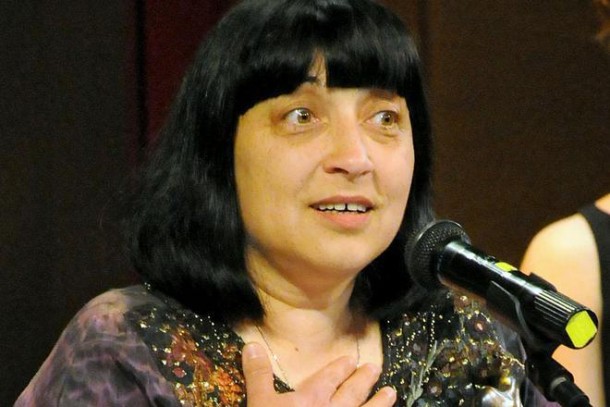
One Small Radio by Maia Novoselskaya. Photo courtesy of the Satire Theatre.
Actually, the jazz in the Radio does not boil down to the brilliant songs interspersing the show. It has a role bigger even than that of Novoselskaya. She is like a soloist in the virtuosic theatre jazz piece this show actually is. It is this not only in the sense of a jam session for mere pleasure—between her, the images on a screen behind her, a voice from behind the wings, the deliberately sparse set and props, plus everything invisible that resides onstage. This show is a genuine piece of theatre jazz where the improvisation only seems to be improvised, where behind the ease in the jumps—text, genre and acting wise—there’s a lot of work and a composition which is a paragon of the abstract montage brought to perfection. The associative jumps are between such impossible distances and above such dizzying heights that the invariably precise landings seem merely improbable. It always works out because the courage here is not just for the sake of being brave but because it’s subjected to a clear aim. Radio is not like some other Moskov shows where the need for a meaning in art is being ridiculed. On the contrary, here the inner energy is extraordinary and constructive.
At times, the show reminds me of the style and devices of the great specialist in abstract montage and in juggling means of expression of different arts and genres—the South African William Kentridge, one of the few theatre directors awarded the Kyoto Prize for contribution to humanity. But these are merely similarities between great artists. There’s no mistaking Moskov’s signature style. Not the least because it’s part of the only new theatre reality in Bulgaria during the last two decades, developed from the unique symbiosis between puppet and drama theatre which has been created and mastered in different variations by him, Morfov and Credo Theatre together with all their and other actors who are graduates from the extraordinary Bulgarian puppet theatre school.
Happiness is considered by many artists and critics as uninteresting, as a superficial or even unserious topic. It depends on the angle at which this most complex and at once most simple answer to the question about life’s meaning is being viewed. It depends on the depth of joy that a piece of art manages to reach while handling this topic: whether it’s just a smile or an inner radiance of light; whether it’s just a triumphant jubilation or a flight of the spirit—pure bliss. Like the music of Strauss that invariably lifts my body off the ground even though at some point it has told me everything it can or could tell me and I switch it off. Or like Mozart, to whom I could listen again and again and who can never bore me because he’s at once like the spirit and like the material, and in both their ways are infinite. Because in him there is, again according to Éric-Emmanuel Schmitt, “another type of wisdom: the wisdom that makes you accept suffering without killing magic”, that wisdom, which “constantly pays tribute to life.”
is author/editor of fourteen books (twelve books on theatre, four of which, in English, launched in New York, London and Wroclaw; and two fiction ones, published in nine countries). She has been a Visiting Scholar/Lecturer worldwide. She served as IATC’s Vice President (2001/2006) and its Director Symposia (2006-2010). She has been serving as an expert at the EC. Currently she is Full Professor of Theatre and Criticism at NATFA, Sofia.
European Stages, vol. 6, no. 1 (Spring 2016)
Editorial Board:
Marvin Carlson, Senior Editor, Founder
Krystyna Illakowicz, Co-Editor
Dominika Laster, Co-Editor
Kalina Stefanova, Co-Editor
Editorial Staff:
Elyse Singer, Managing Editor
Clio Unger, Editorial Assistant
Advisory Board:
Joshua Abrams
Christopher Balme
Maria Delgado
Allen Kuharsky
Bryce Lease
Jennifer Parker-Starbuck
Magda Romańska
Laurence Senelick
Daniele Vianello
Phyllis Zatlin
Table of Contents:
- Hamlet in a Curious Nutshell by Maria Helena Serôdio
- Alvis Hermanis Productions in Latvia and German-Speaking Countries by Edīte Tisheizere
- The Unknown, the Unexpected, and the Uncanny: A New Lorca, Three New Catalan Productions, and a Few Extras by Maria M. Delgado
- 2015 Dance Week Festival and Contemporary Croatian Dance by Mirna Zagar
- Archives, Classics, and Auras: The 2016 Oslo International Festival by Andrew Friedman
- The Stakes for City Theatres: Linus Tunström’s Farewell to the Uppsala Stadsteater by Bryce Lease
- Life is Beautiful? or Optimistically About Bulgarian Theatre? by Kalina Stefanova
- The Multiple Dimensions of the Bulgarian ACT Independent Theatre Festival 2015 by Angelina Georieva
- Theatre in Berlin, Winter 2015 by Steve Earnest
- Musical Theatre in Berlin, Winter 2015 by Steve Earnest
- Gob Squad’s My Square Lady at the Komische Oper by Clio Unger
- New Productions in Berlin by Yvonne Shafer
- Manifest for Dialogue: Antisocial by Ion M. Tomuș
- A Fall in France by Heather Jeanne Denyer
- The Iliad as an Oratory: A Warning to a Civilization by Ivan Medenica
- Escaped Alone by Caryl Churchill at the Royal Court Theatre by Rosemary Malague
- Bakkhai at the Almeida Theatre reviewed by Neil Forsyth
Martin E. Segal Theatre Center:
Frank Hentschker, Executive Director
Marvin Carlson, Director of Publications
Rebecca Sheahan, Managing Director
©2016 by Martin E. Segal Theatre Center
The Graduate Center CUNY Graduate Center
365 Fifth Avenue
New York NY 10016

